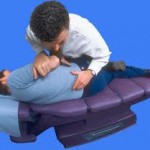Your spine endures all the stresses and strains of your everyday activities. It is built to support the entire weight of your body. Imagine having it and putting it to work the moment you were born. All those years of subjecting it to all those kinds of pressure, there is bound to be a day when you will experience problems with your back.
People from all walks of life experience back pain or have other issues with regard to their spine. For every condition, there is a right back specialist qualified to take care of you. There are three categories of specialists that treat back conditions—primary care (chiropractors, physicians or primary care, osteopathic doctors), specialists for the spine (rheumatologists, neurologists, anesthesiologists, physiatrists, and surgeons), and therapists (clinical psychologists, occupational therapists, physical therapists). Here are some of them that you might just want to consider consulting:
1. Primary care
 This back specialist category is composed of doctors who usually coordinate with physical therapists when it comes to treating back conditions. They are often in the line of non-invasive or non-surgical means to correct back problems. They use medications to help you manage your back problems. If your case is beyond their help, they will be more than happy to refer you to a specialist.
This back specialist category is composed of doctors who usually coordinate with physical therapists when it comes to treating back conditions. They are often in the line of non-invasive or non-surgical means to correct back problems. They use medications to help you manage your back problems. If your case is beyond their help, they will be more than happy to refer you to a specialist.
2. Chiropractor
 A chiropractor diagnoses and treats health conditions associated with your spine, muscles, and nerves. This back specialist concentrates more on the ones associated with the spine. Usually, when it comes to back pains, the chiropractor is the first one to come into mind. Disgnostic imaging, internal disorders, nutrition, sports injuries, neurology, and orthopedics are the common specializations that a chiropractor could concentrate on.
A chiropractor diagnoses and treats health conditions associated with your spine, muscles, and nerves. This back specialist concentrates more on the ones associated with the spine. Usually, when it comes to back pains, the chiropractor is the first one to come into mind. Disgnostic imaging, internal disorders, nutrition, sports injuries, neurology, and orthopedics are the common specializations that a chiropractor could concentrate on.
3. Osteopathic doctor
 An osteopathic doctor, as a back specialist, concentrates on the concept that all the conditions that a person has are associated with the condition of the neuro-musculoskeletal system. This back specialist uses medications, manipulative therapy, and also the services of other therapists for more concentrated treatments.
An osteopathic doctor, as a back specialist, concentrates on the concept that all the conditions that a person has are associated with the condition of the neuro-musculoskeletal system. This back specialist uses medications, manipulative therapy, and also the services of other therapists for more concentrated treatments.
4. Orthopedic surgeon
 An orthopedic surgeon is a back specialist that concentrates on the proper diagnosis and effective treatment of arthritis, trauma, fractures, and sports injuries.
An orthopedic surgeon is a back specialist that concentrates on the proper diagnosis and effective treatment of arthritis, trauma, fractures, and sports injuries.
5. Neurosurgeon
 A neurosurgeon is extensively trained to diagnose and treat various conditions of the spinal cord, nerves, brain, spine, and both intraspinal and intracranial vessels.
A neurosurgeon is extensively trained to diagnose and treat various conditions of the spinal cord, nerves, brain, spine, and both intraspinal and intracranial vessels.
Neurosurgeons are trained in the diagnosis and treatment of disorders of the brain, spine, spinal cord, nerves, intracranial and intraspinal vasculature.
6. Physiatrist
 A physiatrist is also known as a PM&R doctor or physician. This back specialist does not engage in surgery but practices conservative means to treat the conditions of the musculoskeletal system. A physiatrist uses massage therapy, medications, physical therapy (passive and active), and interventional medicine such as nerve root blocks and epidural steroids.
A physiatrist is also known as a PM&R doctor or physician. This back specialist does not engage in surgery but practices conservative means to treat the conditions of the musculoskeletal system. A physiatrist uses massage therapy, medications, physical therapy (passive and active), and interventional medicine such as nerve root blocks and epidural steroids.
7. Anesthesiologist
 An anesthesiologist is a back specialist that specializes in the relief of pain and overall comfort of the patient during pre-surgery, surgery, and post-surgery. Anesthesiologists may be considered a vital part f the perioperative team that helps make sure that the patient is safe during the entire surgery.
An anesthesiologist is a back specialist that specializes in the relief of pain and overall comfort of the patient during pre-surgery, surgery, and post-surgery. Anesthesiologists may be considered a vital part f the perioperative team that helps make sure that the patient is safe during the entire surgery.
8. Neurologist
 A neurologist is a back specialist that specializes in correctly diagnosing and treating the disorders of the entire nervous system such as headaches, epilepsy, strokes, multiple sclerosis, Alzheimer’s disease, Parkinson’s disease, and pain. Neurologists could also subject the patient in a spinal tap to retrieve some spinal fluid for laboratory examination. They could also interpret electroencephalographs (EEG) for seizures, and electromyography (EMG) for muscle and nerve problems. Medications are also prescribed by neurologists. They may also refer you to other specialists and other surgeons. Neurologists do not perform the surgical part of the treatment.
A neurologist is a back specialist that specializes in correctly diagnosing and treating the disorders of the entire nervous system such as headaches, epilepsy, strokes, multiple sclerosis, Alzheimer’s disease, Parkinson’s disease, and pain. Neurologists could also subject the patient in a spinal tap to retrieve some spinal fluid for laboratory examination. They could also interpret electroencephalographs (EEG) for seizures, and electromyography (EMG) for muscle and nerve problems. Medications are also prescribed by neurologists. They may also refer you to other specialists and other surgeons. Neurologists do not perform the surgical part of the treatment.
9. Rheumatologist
 A rheumatologist is a back specialist that concentrates on various musculoskeletal conditions such as arthritis, osteoarthritis, fibromyalgia, osteoporosis, tendonitis, and autoimmune diseases as well. They may also coordinate with other specialists for extensive treatment procedures.
A rheumatologist is a back specialist that concentrates on various musculoskeletal conditions such as arthritis, osteoarthritis, fibromyalgia, osteoporosis, tendonitis, and autoimmune diseases as well. They may also coordinate with other specialists for extensive treatment procedures.
10. Physical therapist
 A physical therapist is a back specialist whose services are required by chiropractors and physiatrists. Physical therapists ask for the patient’s medical history, range of motion, balance, strength, coordination, posture, motor function, respiration, and muscle performance.
A physical therapist is a back specialist whose services are required by chiropractors and physiatrists. Physical therapists ask for the patient’s medical history, range of motion, balance, strength, coordination, posture, motor function, respiration, and muscle performance.
11. Occupational therapist
 This back specialist has the aim of helping the patient perform the activities of daily living. Occupational therapists make sure that they help the patient regain independence and adapt to the condition that they are in at present.
This back specialist has the aim of helping the patient perform the activities of daily living. Occupational therapists make sure that they help the patient regain independence and adapt to the condition that they are in at present.
12. Psychologist
 This back specialist is important in the recovery of those patients with back problems. They provide relief for the stresses and depression that the patients usually experience.
This back specialist is important in the recovery of those patients with back problems. They provide relief for the stresses and depression that the patients usually experience.
Make sure that you consult the appropriate back specialist if you do experience any abnormal pain in your back. Doing this would definitely help you get the best kind of help for your back pains and other associated conditions.
.
